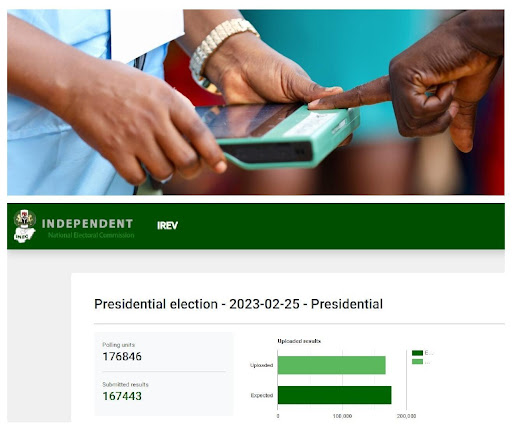By Oluseun Onigbinde

The 2023 presidential elections have not come and gone because their memory still lingers from INEC’s indefensible behavior that crushed trust in the electoral system. If there are lessons to pick in this whole quagmire, it must be that things can get worse irrespective of what technology, innovation, or level of automation is used for elections in Nigeria.
The BVAS accreditation supposed that we had scaled through a period where political parties disrupted the voting process or discriminately allotted votes to themselves after its conclusion. Well, that’s typical of Nigeria’s gradualism that continues to comfort you with the “Rome was not built in a day” cliché . We have a bigger mess on our hands, and it’s the fact that the collation process hasn’t moved an inch from the old, manual addition and subtraction method. While INEC boasted beyond measure that such illegal manipulation won’t happen because they would upload the results in real-time, it never fulfilled an ounce of its promise. Where then do we go from here?
While civil society has done enormous work improving the electoral act to compensate for electronic involvement in the polls, there seems to be too much cuddling with INEC. Civil society must boldly tell INEC it has failed to deepen trust in the election process.
INEC messed up in its ad-hoc and core personnel selection. On the one hand, many of its staff caved in under pressure from politicians to declare election results. On the other hand, the Commission is eager to squander public resources on endless litigation. For instance, in the Kogi North Senatorial District case, why is INEC in a hurry to declare a winner who led by 369 votes marred with polling units’ cancellation and violence, as visually explained by Natasha Akpoti-Uduaghan? Why does the Rivers State Collation Officer for Presidential Elections (SCOPE) reiterate the enormous pressure put upon him, and it still feels okay to accept the result? What exactly is the turnaround time for INEC collation? Why does it feel like politicians have hijacked the collation process dictating when results should be released at the state level?
While INEC oversold its technology solution and even made us drool with its performances in the Osun and Ekiti elections, it was a shock to see its electronic collation platform fail during the presidential and governorship elections. In partnership with Dean Initiative and Hallowmace Foundation, Civic Hive hired persons to relay election results at 774 local government and 469 House of Representatives and Senatorial Collation Centers. We believed this mechanism would help in rapid access to election results, allowing Nigerians to see things in real-time. Our idealism was punctured when we discovered that election results at the LGA were only partially collated as late as noon on Sunday, one day after the election. This alerted us that something was wrong with the collation process.
Politicians have heavily compromised INEC staff, especially at the state and ward levels. This was reinforced especially in elections where the state governors acted like warlords or exhibited antics geared towards a “do or die affair.” It is evident that in such a situation, the institutions—police, military, INEC—gravitate towards the political authority, thereby compromising the entire process. Thugs can disrupt an election and snatch and burn ballot papers while the police watch, helpless. The treasonable and atrocious crimes won’t matter if they were ordered from above. One wonders if this will not mean our elections might get more violent, with opposing camps also unleashing their measure of violence. And once elections are on tight margins, the ruling party within the state can continue to use force to reduce margins through violence and suppression until it finds a way to leap ahead.
We are also learning that technology cannot fix a broken system. It is only through applying values and a consequence framework that change can happen. We have seen situations where BVAS machines were destroyed or jettisoned or even where INEC officials boldly stated that they had been instructed that uploading would only occur at the Collation Centeragainst INEC’s rules. Like Mr Tunji Lardner would remind us, “We are applying technical solutions when our issues are mostly adaptive.” It is obvious that through state coercion and institutional capture, the political class has mastered how to apply dark arts even before using any technology.
Technology will not save us, and it is clear that our winner-takes-all attitude and the perks of political office will continue to erode our values. The difficult task is how will the political class enforce sanctions they are complicit in. The bastardization of Nigerian institutions, where they can’t separate duty from operational control, is such a sad spectacle.
This might be a time for civil society to be wary. If there’s ever an opportunity to reform Nigeria’s electoral system comprehensively, it is now. After the enormous positives from 2015 that showed progress, it is evident that regression is possible if our voices aren’t loud or if we cuddle with the institution just to protect our access. INEC should get no further camaraderie but intense scrutiny of its activities, especially on adherence to its guidelines. The institution is yet to sort out its logistics issues which an open technological application can fix. The political class will respond positively if corrupt collation officers are prosecuted, and the institution rejects rigged results. However, if INEC uses its officials and university professors to affirm dishonest and doctored results, it will continue expanding public distrust.
INEC also needs to raise its voice that a successful election is not its sole making. The enormous burden of a successful election also includes the political class and security institutions. I noticed that in the recent elections, police officers arrived early, yet we have pockets of incidence where they stood aloof while votes were manipulated or voters suppressed. INEC needs assurances and direct communication for consequence management and escalation with other agencies.
We hoped this election would herald a new paradigm for Nigeria’s democratic experience. The prospect of a third force candidate also energized urban voters, especially in southern Nigeria. However, it is time to inform the political class that if our democracy is expected to thrive, it must be drawn from legitimacy. If public offices are rooted in service, they must not be forced on the people. Those who lead INEC or collate results must also care about their legacy, as the continuous use of the judiciary to decide election winners is not a pointer to a credible electoral system.
One must acknowledge the sheer bravery of Nigerians excited to be part of the electoral season that would lead to a new Nigeria. While the final voter participation rate of 27% falls below the standard, the current statistic also calls for further cleanup of the voter register and intensified voter education toward fuller participation in future elections. To receive over N305 billion to conduct this election meant Nigerians expected nothing but the best the institution could give, but it delivered a shoddy performance. The people only partially accepted the results as credibility waned over the period. Hence, INEC needs to sit down with its partners and do honest soul-searching on where it missed its steps.

– Oluseun Onigbinde is the co-founder and CEO of budgIT.
